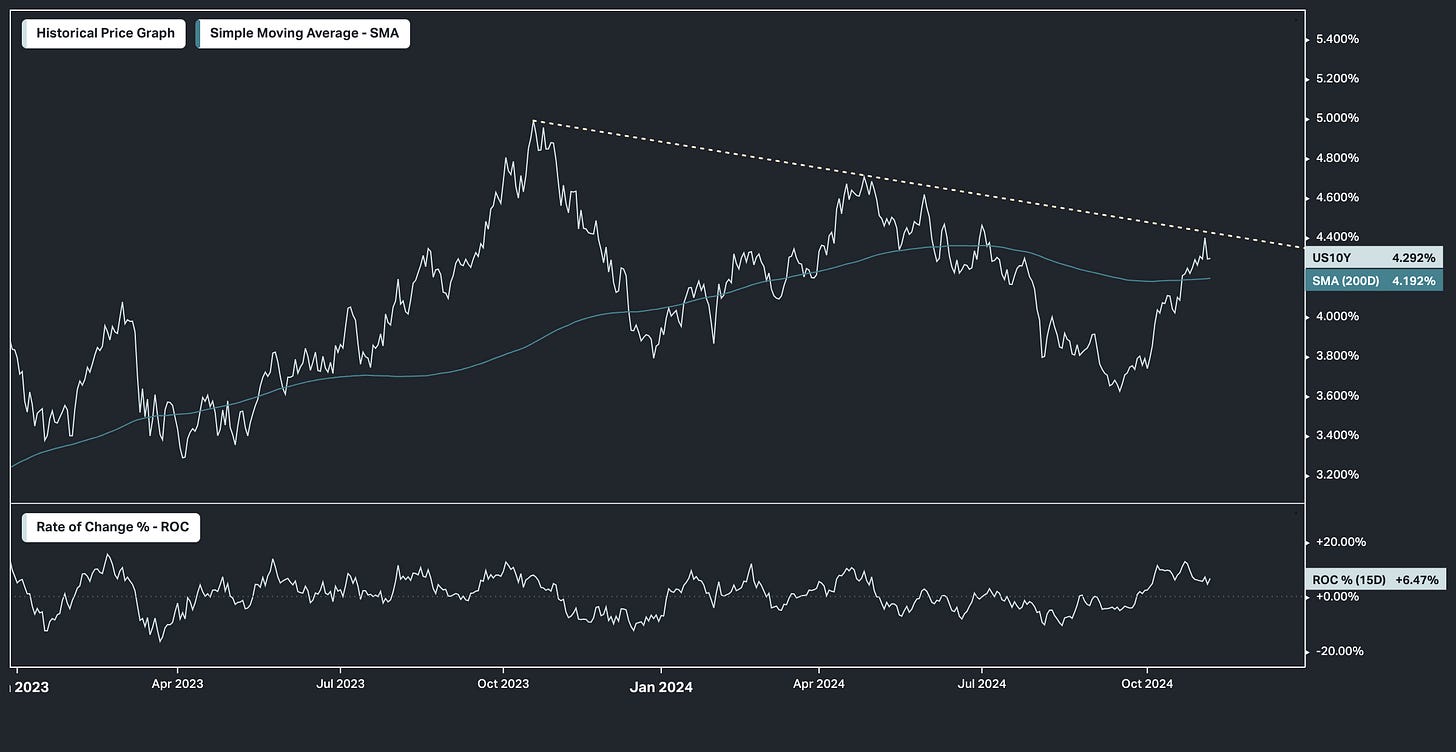Unknowable
Stocks in the US finished lower on Monday as investors braced for a high-stakes week featuring the presidential election and the Federal Reserve's policy decision.
The S&P 500 and Nasdaq lost 0.3% each while the Dow dropped 257 points.
Among mega caps, Apple (-0.4%), Microsoft (-0.5%), Amazon (-1.1%), Alphabet (-1.2%) and Meta (-1.1%) booked losses while Nvidia shares rose 0.5% following news that it will replace Intel (-2.9%) in the Dow Jones, reflecting Nvidia's dominance in AI.
Election uncertainty also weighed on markets, with polls showing a close race between Kamala Harris and Donald Trump and questions over Congress’s future control.
Investors are also focused on the Federal Reserve’s anticipated 0.25% rate cut on Thursday, looking for signals on inflation and the job market.
As we head into today’s very high stakes election, the betting markets have narrowed in recent days, but remain in favour of Trump. Let's take a look at the bond market.
Despite a larger than expected rate cut by the Fed back in September, and Fed forecasts of another 50 basis points before year end, and another 100 basis point next year, the market has taken interest rates UP, not down.
The narrative on this move in the 10-year yield has been developed through claims from the media and select "experts" that a Trump administration 2.0 would be inflationary.
You can see it in the trajectory of yields as the probability of a Trump win has risen over the past month.
However, the move in rates has been global.
Yields on UK gilts have risen even more aggressively than the rise in US Treasury yields since mid-September.
Interestingly, this move in UK yields comes with a new budget proposal under the new Prime Minister Keir Starmer, which increases taxes, regulations and borrowing in an economy that's barely growing.
Remember it was September 2022, under a new UK Prime Minister Liz Truss, when her new pro-growth budget proposal led to a sharp spike in interest rates:
UK stocks fell about 10%.
The pound fell by 11%.
The UK government bond market broke, and required a rescue from the Bank of England.
They ran Liz Truss out of office by the end of October, due to "severe economic consequences of her policies."
Conversely, while Starmer's new low growth/high spending budget has had criticism, and rates have risen sharply, back to those unsustainable September 2022 levels, there has been no such call for Starmer's resignation.
With the above in mind, Liz Truss called out the UK "financial establishment" earlier this year, for colluding to bring down her government, by;
the Bank of England selling 40 billion pounds worth of UK government bonds the night before her budget was revealed (which pushes bond prices down/rates up),
the Bank of England raised interest rates by 1/2 point that month,
the Office of Budget Responsibility (OBR) leaked a forecast on the Truss budget that inaccurately claimed a big financing shortfall,
she said there were other leaks to the media on the budget.
This, all to say that Liz Truss has warned the Trump administration that the U.S. administrative state (which he wants to right size) could use the bond market (i.e. spike interest rates) to create economic chaos and thwart the execution of his agenda.









